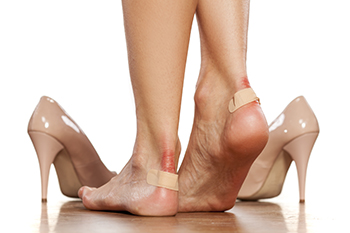
Blisters, often caused by friction from wearing ill-fitting shoes, are fluid-filled bubbles that protect injured skin. While they generally heal on their own, blisters can become infected if the protective skin breaks. An infected blister may feel warm, produce pus, and emit a foul odor. Other symptoms can include increased pain, swelling, and bleeding. Without proper care, an infected blister can lead to serious complications like cellulitis or sepsis, both of which require urgent medical attention. It is important to keep the blister clean and monitor it closely for signs of infection. If an infection is suspected, a podiatrist can provide the appropriate treatment, which might involve draining the blister and prescribing antibiotics or antifungal medications. Podiatrists are equipped to manage and treat infected blisters effectively, ensuring proper healing and preventing further health risks. If you have a foot blister that has become infected, it is suggested that you schedule an appointment with a podiatrist for an exam and treatment options.
Blisters may appear as a single bubble or in a cluster. They can cause a lot of pain and may be filled with pus, blood, or watery serum. If your feet are hurting, contact Kent DiNucci, DPM of Ankle and Foot Clinic . Our doctor can provide the care you need to keep you pain-free and on your feet.
Foot Blisters
Foot blisters are often the result of friction. This happens due to the constant rubbing from shoes, which can lead to pain.
What Are Foot Blisters?
A foot blister is a small fluid-filled pocket that forms on the upper-most layer of the skin. Blisters are filled with clear fluid and can lead to blood drainage or pus if the area becomes infected.
Symptoms
(Blister symptoms may vary depending on what is causing them)
- Bubble of skin filled with fluid
- Redness
- Moderate to severe pain
- Itching
Prevention & Treatment
In order to prevent blisters, you should be sure to wear comfortable shoes with socks that cushion your feet and absorb sweat. Breaking a blister open may increase your chances of developing an infection. However, if your blister breaks, you should wash the area with soap and water immediately and then apply a bandage to the affected area. If your blisters cause severe pain it is important that you call your podiatrist right away.
If you have any questions, please feel free to contact our office located in Omaha, NE . We offer the newest diagnostic and treatment technologies for all your foot care needs.
